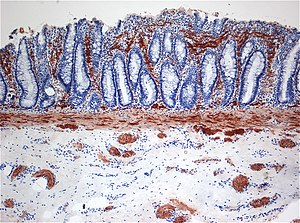Hirschsprung's disease
| Hirschsprung's disease | |
|---|---|
| Synonyms | Hirschsprung disease, congenital megacolon, congenital aganglionic megacolon |
 |
|
| Histopathology of Hirschsprung disease. Enzyme showing aberrant acetylcholine esterase (AchE)-positive nerve fibers (brown) in the lamina propria mucosae. | |
| Classification and external resources | |
| Specialty | medical genetics |
| ICD-10 | Q43.1 |
| ICD-9-CM | 751.3 |
| OMIM | 142623 |
| DiseasesDB | 5901 |
| MedlinePlus | 001140 |
| eMedicine | med/1016 |
| MeSH | D006627 |
Hirschsprung's disease (HD) is a form of megacolon that occurs when part or all of the large intestine or antecedent parts of the gastrointestinal tract have no ganglion cells and therefore cannot function. During normal prenatal development, cells from the neural crest migrate into the large intestine (colon) to form the networks of nerves called the myenteric plexus (Auerbach plexus) (between the smooth muscle layers of the gastrointestinal tract wall) and the submucosal plexus (Meissner plexus) (within the submucosa of the gastrointestinal tract wall). In Hirschsprung's disease, the migration is not complete and part of the colon lacks these nerve bodies that regulate the activity of the colon. The affected segment of the colon cannot relax and pass stool through the colon, creating an obstruction. In most affected people, the disorder affects the part of the colon that is nearest the anus. In rare cases, the lack of nerve bodies involves more of the colon. In five percent of cases, the entire colon is affected. The stomach and esophagus may be affected too.
Hirschsprung's disease occurs in about one in 5,000 of live births. It is usually diagnosed in children, and affects boys more often than girls. About 10% of cases are familial.
Typically, Hirschsprung's disease is diagnosed shortly after birth, although it may develop well into adulthood, because of the presence of megacolon, or because the baby fails to pass the first stool (meconium) within 48 hours of delivery. Normally, 90% of babies pass their first meconium within 24 hours, and 99% within 48 hours. Other symptoms include green or brown vomit, explosive stools after a doctor inserts a finger into the rectum, swelling of the abdomen, lots of gas and bloody diarrhea.
...
Wikipedia
